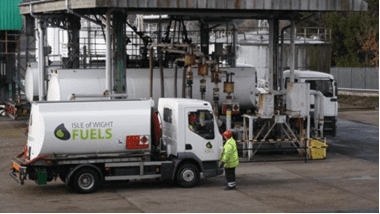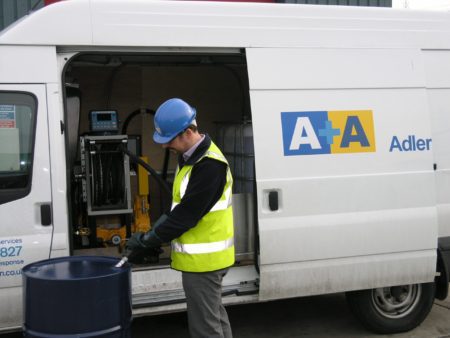
This morning more than 40 BP tanker drivers, working out of the Grangemouth oil refinery walked out in a dispute over cuts to pay and pensions.
With the walkout scheduled to last until 8am on Monday morning (25th February), Unite believes that the action will affect aviation supplies and BP forecourts across Scotland and north east England.
According to Unite, 90% of the 42 drivers balloted voted for strike action following the transfer of an aviation contract from BP to DHL. The union estimates that drivers could lose up to £100,000 from the value of their pensions and £1,400 a year in wages as a result.
A BP spokeman said: “Our priority remains the safe delivery of fuel products to all our customers. We have been working to, and continue to work to, minimise any potential disruption the industrial action planned for this weekend at Grangemouth could cause.”
Tony Trench, Unite’s regional industrial officer remarked: “It’s an outrage that BP, a multi-national giant which earns billions every year, is exploiting the UK’s weak employment laws to effectively swindle workers out of their retirement savings and future earnings.”
The union has announced a ban on overtime from Monday and if the dispute is not resolved quickly, a second four-day strike is scheduled for 28th February.

When kerosene is being distributed by taxi rather than tanker, it’s time to take action. Air your views on the heating oil market, among other hot topics, at the Distributor Debate on Thursday 7th March. Reserve your FREE place(s) today by emailing sandra@fueloilnews.co.uk
As the Northern Ireland Housing Executive carries out a consultation on its heating policy, you are cordially invited to join in the Fuel Oil News Distributor Debate on Thursday 7th March.
Highlighting an overdependence on oil, the report says that whilst oil is technically a good heating solution, it is increasingly difficult to afford with ‘the lack of a PAYGO option a major factor’.
It also points out that switching to oil does not currently have the same benefits for tenants as it did in previous policy periods.
Among the questions being asked are:Oil heating is clean and efficient but requires bulk fill ups which are expensive. What ways do you think the problem of finding the money for this could be overcome?If you live in a rural area and oil or wood pellet systems are your only choice, what would be your preference?What are your views on schemes using saving stamps or local community “pay as you go” schemes and would you welcome such a community based scheme if it was available?
__________________________________________________________ DISTRIBUTORS ACROSS IRELAND ARE ALL WELCOME TO JOIN IN THE DISTRIBUTOR DEBATE AT THE TEMPLETON HOTEL, TEMPLEPATRICK WHEN ISSUES SUCH AS THESE WILL BE DISCUSSED. REGISTER FOR YOUR FREE PLACE(S) TODAY sandra@fueloilnews.co.uk__________________________________________________________
Responses to the consultation can be made in writing or email. Download the heating policy review document, the questions and accompanying letter at www.nihe.gov.uk/index/corporate/consultation.htm Additionally, a Rural Homes and People Draft Action Plan 2013-2015 has also been published with actions ‘designed to ensure that an equitable share of available resources is directed to rural areas’. The NIHE intends to ‘undertake the actions listed by March 2015, subject of course to the necessary funding being available’.
To return to the newsletter click here.

Isle of Wight Fuels providing high quality products at competitive prices
The award was presented to Isle of Wight Fuels by Community Buying unlimited, the co-ordinator of community buying initiatives in 22 counties in the UK.
Dave Grannum, general manager of Isle of Wight Fuels said: “This award demonstrates that despite the additional costs and logistics of bringing oil to the Isle of Wight – we’re still able to provide fuels to Island homes and businesses at a cost which is in line with mainland suppliers.
“Our aim is to provide high quality products at competitive prices – this award shows that we’re achieving this goal.
We’re committed to providing an outstanding service and will continue to offer a fair price to all our customers.”
Isle of Wight Fuels owns and operates the Isle of Wight’s only fuel storage facility and distributes oils and fuels to domestic and commercial customers across the Island. Oil is shipped into the terminal in East Cowes by the company’s own tanker, the Rix Merlin. The facility in Kingston Road stores up to three million litres of fuel for domestic and agricultural use, as well as supplying fuel for filling stations, commercial operations and distributors, to keep the Island running.
Community Buying Unlimited placed orders for more than 7 million litres of oil in 2012. Speaking about the 2012 awards, founder Chris Pomfret said: “Last year was an incredible year for community buying groups in general and oil buying groups in particular. These individuals, suppliers and organisations went the extra mile and certainly thought way outside the box to help make community oil buying an even bigger social and environmental success.” www.isleofwightfuels.com www.community-buying.com
To return to the newsletter click here.

This first Essar branded tanker is now working on deliveries to commercial customers
Last week Essar Oil (UK) unveiled its first ever Essar liveried tanker at the company’s Stanlow manufacturing complex
The tanker, which is set to become a familiar sight on the motorways of north west England, will be used on commercial deliveries. Operated by Flexigrid, Essar’s haulage service provider, the vehicle is the first branded tanker to be put on the road since Essar acquired the site in August 2011.
Colin Dixon, head of marketing at Essar Oil, said: “Our priority since acquisition has been to build our reputation for being a reliable supplier with whom it’s easy to do business. On the back of getting these basics right we’ve been able to expand our business, including that part in which we deliver fuel into the premises of the bus & rail companies, hauliers, parcel delivery companies, manufacturers and resellers. The fact that we’ll now have a very visible presence out on the roads is a sign of our determination to attract new customers, further grow the business and build our brand in the UK.”
“We’re delighted to have an Essar branded vehicle as part of our fleet and look forward to growing our partnership with Essar over the coming years,” added Michael Blundell, Flexigrid director. The branding of the tanker reflects the hard work of the staff at both companies over the last 18 months, in particular the professionalism of the drivers in delivering the highest level of service.”
To return to the newsletter click here.

Released on 30th January, the Freight Transport Association (FTA) has hailed the OFT report into competition in the UK road fuel sector as ‘just a side show’.
The report found rises in pump prices for petrol and diesel over the last ten years have been caused largely by higher crude oil prices and increases in tax and duty and not a lack of competition. The evidence gathered suggests that at national level competition is working well in the UK road fuel sector, although it has identified an absence of pricing information on motorways as a concern and does not rule out taking action in some local markets if there is persuasive evidence of anti-competitive behaviour.
_______________________________________________________________
FOR A DETAILED LOOK AT THE REPORT’S FINDINGS –
SEE THE INSIDE OUT PAGE IN THE MARCH ISSUE OF FUEL OIL NEWS
_______________________________________________________
The FTA however believes that fuel duty still remains at the heart of the pump price problem. James Hookham, FTA managing director policy & communications, said: “This report won’t change anything, and FTA believes it is only a distraction from the real issue of fuel duty and the chancellor still has to do something.”
Mr Hookham’s message to the consumer at the pumps was: “In our view, the quickest and most effective way to get expensive petrol down is not to buy it. Quite simply, if there are scurrilous petrol retailers who set their own pump prices, then don’t go to them – take a leaf out of the commercial operators’ handbook and don’t get ripped off.”
Through its work with FairFuelUK, FTA continues to campaign on behalf of its members, calling on government to recognise in its forthcoming Budget the positive economic benefits (demonstrated by both the CEBR and NIESR reports) that a cut in fuel duty could have.
Clive Maxwell, OFT chief executive, said: ‘We recognise that there has been widespread mistrust in how this market is operating. However, our analysis suggests that competition is working well.
“Competition appears to be strong at national level. Where we receive evidence of potential anti-competitive behaviour we will consider taking action. For example, we’ve recently opened an investigation into the supply of road fuel in the Western Isles of Scotland.’ www.oft.gov.uk
To return to the newsletter click here.

Jan Trocki, marketing and technology general manager at Morris Lubricants will be speaking at the 17th ICIS World Base Oils and Lubricants Conference in London.
Addressing around 600 delegates this Thursday (21st February) at the Hilton London Metropole, Jan will focus on the challenges facing smaller blending companies. Despite difficult operating environments, he will reassure delegates that there are many strengths and advantages amongst these companies.
Jan will also act as chairman for the conference on day two (Friday 22nd February), which will include speakers from Shell and Peugeot.
A prominent figure in the European lubricants industry, Jan was recruited last April by Shrewsbury-based Morris Lubricants. He previously held senior managerial positions with BP, Castrol and SK Lubricants Europe BV, a subsidiary of Korea’s largest energy company for three years. He is chairman of the technical council at ATIEL, the technical association of the European lubricants industry.
It will be the third year running that Jan has addressed this major conference, which attracts delegates from around the world and shares unrivalled market intelligence.
www.icisconference.com/worldbaseoils
www.morrislubricants.co.uk
To return to the newsletter click here.

As an oilfield tax allowance paves the way for hundreds of new jobs in the UK, the Oil and Gas Global Salary Guide 2013 says UK oil and gas professionals are well rewarded.
Based on data from over 25,000 respondents, the guide produced by Hays Oil & Gas and job site, Oil and Gas Job Search shows that full time professionals in the UK oil and gas industry enjoy average salaries of £57,900 per annum – a rate of growth of 7.2% from last year and more than twice the current rate of inflation.
A rise in bonuses has continued and is now the dominant mechanism by which companies attract and retain talent. On average, bonuses account for a further 5.8% of the employees overall package with almost two thirds receiving some kind of benefit or allowance on top of their basic salary.
Download a free copy of the guide www.hays.com.au/employer-services/oil-gas-recruitment/Salary-guides/HAYS_089070
www.oilandgasjobsearch.com/SalaryGuide
Making the most of a valuable national asset
As the government stimulates investment in the North Sea to ‘make the most of this valuable national asset’, EnQuest, the North Sea’s largest independent UK oil producer, has secured a brownfield tax allowance to fully exploit its Thistle oilfield. The move will safeguard almost 500 existing jobs and create almost 1000 new jobs across the UK oil and gas supply chain in Aberdeen, Newcastle, Manchester and Swansea over the next three years.
“We acquired Thistle in 2010, and as a result of our investment so far production has significantly increased,” said David Heslop, general manager for EnQuest in Aberdeen. Thistle is a prime example of how we’re able to recover more oil from mature assets through a combination of innovative ways of working and technical expertise. It demonstrates what EnQuest does best and underlines our long-term commitment to the North Sea.”
“Oil and gas will still be needed to provide 70% of our energy needs into the 2040s,” added Mike Tholen, Oil & Gas UK’s economics and commercial director. “EnQuest’s decision to make fresh investment in the Thistle field will provide hundreds of jobs right across Britain and with extra oil being extracted, UK energy security will be strengthened.” www.enquest.com
To return to the newsletter click here.

Adler & Allan is one of the companies taking advantage of Alpeco’s bespoke liquid loading and dispensing systems
With a big reduction in the number of new tankers produced last year, manufacturers and ancillary equipment suppliers are increasingly turning to niche markets.
One niche area which has attracted the attention of Alpeco is bespoke liquid loading and dispensing systems for depots, harbours and trucks, with the company focusing its efforts on the design and manufacture of such equipment.
A unit with a small demountable electric pump and meter system is now available from Alpeco. Designed to be carried in a van or pick-up truck with an IBC or small storage tank, the unit is ideal for conducting small fuel deliveries to plant equipment such as generators, or for sites with difficult access where it may not be practical or cost efficient to send a delivery tanker._____________________________________________________________For more news on the niche markets being served by tanker manufacturers, see the 2013 Tanker Review in the February issue of Fuel Oil News._____________________________________________________________www.alpeco.co.uk
To return to the newsletter click here.

Chris Dalton, managing director
Just a few months after opening, Lateu Logistics has the ‘enviable position of working outside the UK as well as closer to home’, says managing director Chris Dalton.
The team at Lateu Logistics has over 40 years combined experience within the transport industry. The company, which was established to fill a gap in the energy/chemical sector for experienced consultancy across the total supply chain logistics, has recently refined its online presence to better showcases its skills.
“In a very volatile world where austerity is the key word, people are changing their perceptions on spending and value,” said Chris. “With businesses needing to evaluate their modus operandi, Lateu Logistics can help them decide the way forward from an impartial and knowledgeable base, taking a holistic view of their supply chain and business development needs of the future.”
“We can also enhance our offering to clients with outsourced support services including planning, customer services, logistics management and sub-contractor selection which the client can no longer undertake internally due to cost, skill or corporate policies.” www.lateulogistics.com
To return to the newsletter click here.

Speaking on the subject of top up, the majority of distributors to whom Fuel Oil News recently spoke had only a small number of customers opting for the service
So which customers are using top up, and is the service in decline due to the proliferation of price comparison sites?
Less than 5% of Nolan Oils’ customers use top up said transport manager, Mark Mackenzie. “It’s becoming less popular as everyone’s pushed further into comparing prices for everything. When prices didn’t change every five minutes you’d find a much more loyal customer base, willing to sign up to standing order accounts and top up services in the knowledge that they were getting a fair price and a reliable supply.”
“I think the level of top up will grow if there’s a challenging winter,” commented Craggs Energy managing director, Chris Bingham. “That’s when customers start to focus on the guarantee of supply which comes as part of most top up services.”
Which customers are using top up?
Whilst some distributors, including AD Fuels, reported a broad spectrum of customers keen to top up; for others, top up customers fall into very specific sectors.
“Our service is used mostly by the elderly, those who work away from home and by second homeowners,” Mark Mackenzie told FON. “We also encourage top up for those customers who habitually run out, but it’s hard to educate some people…. However, when you offer the service we do, customers know they’ll only wait a day or two, at the longest, for a delivery.”
“A good percentage of customers using this service are sons and daughters caring for elderly parents,” says Stevenage Oils’ account manager, Lisa Armstrong. “Others include community centres and conference venues that mustn’t run out, and those who aren’t particularly worried about cost.”
At Craggs Energy top up is offered to a small but solid set of customers, often along with a fixed monthly payment model. Chris Bingham commented: “Many customers are what might be termed vulnerable, but we also have a number who just want to forget about the need to check their oil and trust us to manage the levels.”
Is top-up in decline?
Mark Mackenzie believes that the number using top up services has noticeably declined since the rise of price comparison sites. “More and more customers are quoting online buying site prices when they either ring for a quote or wish to compare their current supply situation.”
AD Fuels’ Rob Warne shares this view: “Generally people are shopping around more – customers admit to it.”
Ribble Fuels has not, however, noticed any affect. Managing director, David Hodge, said: “We’re talking about two very different markets. Customers that use our top up service tend to be those that want to pay by direct debit and spread the cost, or they’re loyal, regular customers.”
Chris Bingham adds: “I don’t know if price comparison sites are impacting the top up model. As we offer a full online pricing/ordering system, we’re pulling in a strong number of online customers directly.
“I do feel that the industry risks losing control of online sales if it doesn’t offer such a sales channel. With the vast majority of distributers shying away from providing a direct online service, we’re encouraging third parties to build alternative sales channels that carry none of the costs and risks that we’re forced to shoulder. Other industries have found to their cost how fast this can develop, and we can only blame ourselves if we allow it to happen.”
Trusting telemetry
Concerns were raised as to the effectiveness of available telemetry to assist with top up. “Telemetry isn’t as good as it needs to be,” said David Hodge. “At any one time there can be 10-15% of monitors not working and often batteries are dead.”
Consequently, some did not feel confident relying on technology; Marsh Fuels being one. “We use good old-fashioned pen and paper, cutting costs and getting back to basics,” said Carried Marsh. “After all, I don’t recall ever hearing of a pen’s battery running out or it being useless in a power cut! We review customers’ annual usage and provide a delivery schedule which is 90% effective. It’s much easier than temperamental (in our experience) electronic readings or confused customers.”
Stevenage Oils also runs a manual service as Lisa Armstrong explains. “The emphasis is on the customer to request top ups, it’s not a service we actively promote. The customer sets up a delivery timescale and it’s up to them to let us know if they want to amend this. We do monitor accounts on a regular basis as we don’t want our drivers turning up to deliver oil and finding that it’s not needed!”
For Melanie Noel, WP Group’s fuel sales manager: “Whilst there have been a few issues with the older systems, mainly the battery, the new telemetry has improved.”
Find out how telemetry has been improved when Fuel Oil News looks at the very latest telemetry products in the January issue of Fuel Oil News.











